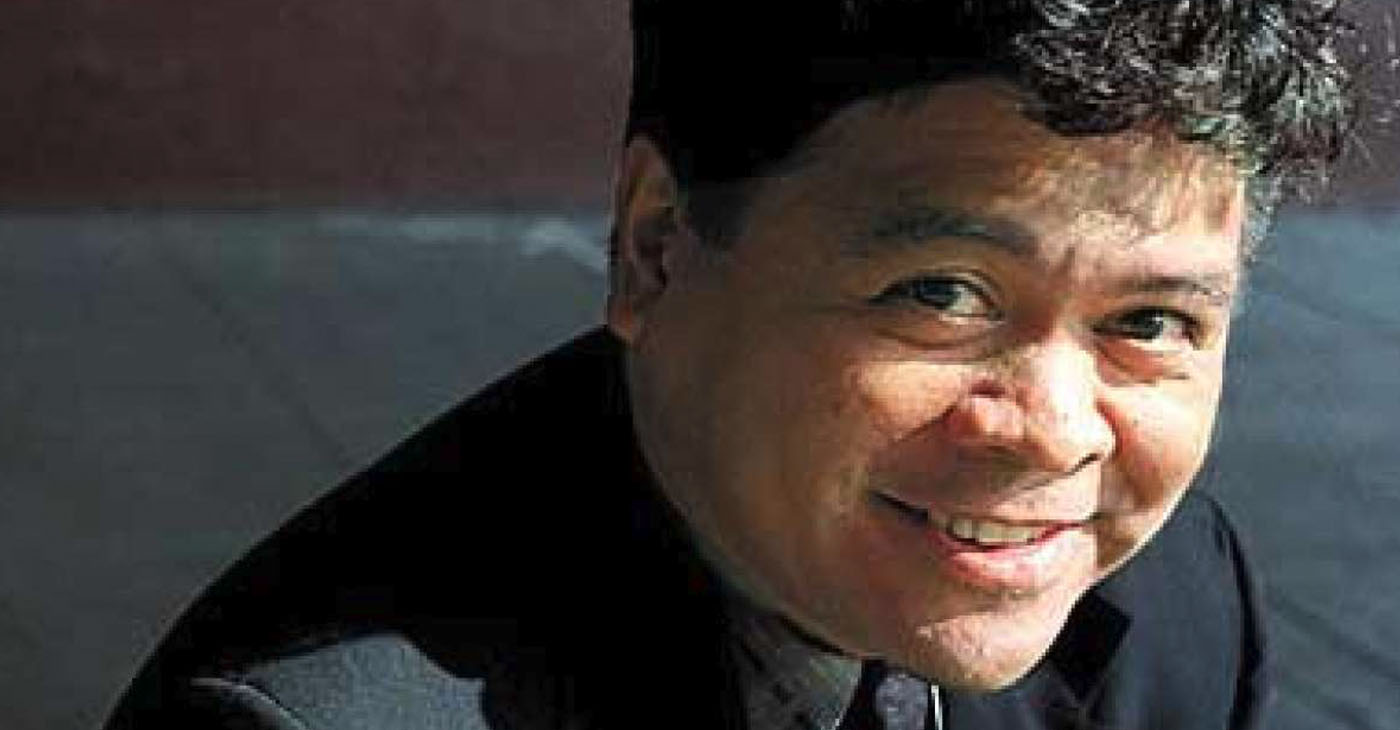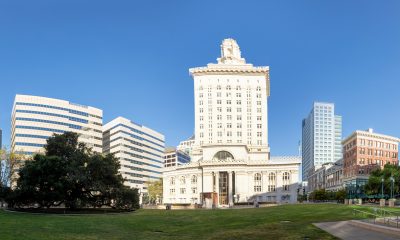Black History
OPINION: Warrior Parade Was America’s Juneteenth Celebration
The Warriors are full of talented millionaires, even among the bench warmers. Jonathan Kuminga, 19, is a future all-star on a four-year/$24.8 million deal for an average annual salary of $6.2 million. Former top draft pick James Wiseman has been hurt but is still on a salary that averages $9.9 million a year. Nothing like Curry’s deal, but just wait till their stars shine.

By Emil Guillermo
This past week we saw the celebration of Juneteenth come alive with coincidence.
On the second year since it became a federal holiday, people began to understand the day for what it was. A delay of the end of slavery, which officially was abolished with the announcement of the Emancipation Proclamation on Sept. 22, 1862, signed 100 days later, but not practically ended until the U.S. Army brought word to Texas which had continued slavery until 1865.
When it comes to social justice, even when you win, some will slow roll you to the very end. Blame it on the post office? It took an army to deliver the news.
So, Juneteenth is a worthy celebration both to note the real end of slavery and to celebrate the triumph of truth and history.
But, this is why there are still forces out there that don’t want Americans to know even rudimentary aspects in U.S. history that may be critical of whites, or harmful to white self-esteem. Everyone should know of the reluctance to end slavery among those who still valued free labor that masked real racism.
On Juneteenth everyone was back on the same page. It was like America was finally on the same team.
And that’s why the coincidence of the Golden State Warrior parade was somehow fitting. Sure, the parade was in San Francisco, but Oakland is where the soul of the team has been since their days at Oracle.
To see them celebrate a fourth NBA basketball championship in eight years was remarkable. Because who were the stars? There was Stephen Curry holding up his trophies, puffing a cigar like a mogul. The 34-year-old is on a four-year contract worth $215,353,664, that expires in 2026. That’s an average salary of $53.8 million, all according to the website Spotrac.
Curry’s the MVP. But the other stars are all well paid. Andrew Wiggins is at $35+ million a year. And as he and teammate Jordan Poole joked in the locker room after the Game Six win for the championship, both are expecting a “bag.”
Wiggins’ bag will be bigger, and Poole’s bag should shoot up from his current $2.5 million annual salary. The Warriors already have the NBA’s biggest payroll, and the post-season adjustments will push the team to a record luxury tax.
But the Warriors can afford it. They already make a ton of money from the games, from attendance, from merch, from international rights, so the players shouldn’t be shortchanged nor the true beneficiaries of the sport, the fans.
The Warriors’ two owners — Joe Lacob, a former Silicon Valley venture capitalist, and movie producer Peter Guber — were part of a group that paid $450 million for the team in 2010. Forbes Magazine estimates the team is now worth 10 times their investment. That’s $4.5 billion. And that’s probably a low figure.
I think the Warriors can afford the luxury tax.
And it’s significant to note because, in the NBA, we are talking about African American labor being compensated here, richly but fairly.
The Warriors are full of talented millionaires, even among the bench warmers. Jonathan Kuminga, 19, is a future all-star on a four-year/$24.8 million deal for an average annual salary of $6.2 million. Former top draft pick James Wiseman has been hurt but is still on a salary that averages $9.9 million a year. Nothing like Curry’s deal, but just wait till their stars shine.
On parade day, Guber said he wants a “sequel.” And that, like everything else in capitalist America will cost money. It’s good to see them seem willing to pay the price for extraordinary talent in a country where for so many years Black labor was free.
That’s what we celebrated as a country on Juneteenth. The Golden State Warrior Championship parade may as well have been the symbolic national celebration for the entire country. It left us with a feeling that we were all on the same team.
Emil Guillermo is a journalist and commentator. See him at www.amok.com.
Activism
2024 in Review: 7 Questions for Social Justice Executive Kaci Patterson
Kaci Peterson, the founder and Chief Architect of Social Good Solutions and the Black Equity Collective, has over 18 years of experience in the non-profit and philanthropy sectors. California Black Media (CBM) spoke with Peterson recently. She discussed the organization’s successes, disappointments, and lessons from 2024 as they continue their initiatives into the new year.

By Edward Henderson, California Black Media
The Black Equity Collective (BEC) is a community-focused, public-private partnership with Black equity as its central, driving force.
Born out of two organizations – the Social Good Solutions Firm and the Black Equity Initiative — BEC’s mission is centered on the belief that progress on Black equity and racial justice must be part of any credible social justice movement in the United States. Additionally, the collective believes equity is only achieved when philanthropic investments, public policies, and institutional practices converge to boldly confront racial injustice.
Kaci Peterson, the founder and Chief Architect of Social Good Solutions and the Black Equity Collective, has over 18 years of experience in the non-profit and philanthropy sectors.
California Black Media (CBM) spoke with Peterson recently. She discussed the organization’s successes, disappointments, and lessons from 2024 as they continue their initiatives into the new year.
Looking back at 2024, what stands out to you as your most important achievement and why?
This year, we celebrated our 10-year anniversary as a firm. Since the firm’ s inception we are proud to announce that cumulatively we’ve been able to raise and leverage over $55.5 million for Black-led organizations in California.
One of the things that we have accomplished is our expanded membership. We had an initial goal of 30 to 40 organizations. We have a current membership of 54 organizations and a waiting list of over 120.
How did your leadership and investments contribute to improving the lives of Black Californians?
We launched a survey involving 200 Black-led organizations to study the economic impact of Black-led organizations on California’ s GDP. The results of that survey will be released in early 2025.
What frustrated you the most over the last year?
The decline in philanthropic investment after the height of commitments following the murder of George Floyd, following COVID.
What inspired you the most over the last year?
I am always inspired by the leaders on the ground who just continue to do monumental work. The fact that here in Los Angeles, we’ve been able to stand up a doula hub in response to the policy advocacy work that so many of our leaders, our Black women in particular, really pushed and got state legislation passed a couple of years ago so that doulas can be an approved and reimbursable expense through Medi-Cal.
What is one lesson you learned in 2024 that will inform your decision-making next year?
I started an 11-week sabbatical on Nov. 1. I think oftentimes as Black leaders, we are burning the candle at both ends. And I don’ t think Black people are even aware of the social, emotional, and physical toll that taken on us/ We must rest, retreat and take respite as part of our journey to justice.
In one word, what is the biggest challenge Black Californians face?
Erasure.
We’ve really leaned into a narrative of Black permanence and what it means to preserve our community, our culture, our contributions, our language, our history, our leaders, our institutions.
What is the goal you want to achieve most in 2025?
I really want to start up an endowment for the collective. I think it’s really important to be able to preserve all of the things that the collective has contributed the philanthropic ecosystem so far.
Activism
2024 in Review: 7 Questions for the Equal Justice Society
Currently, the Oakland-based nonprofit focuses its advocacy efforts on school discipline, special education, the school-to-prison pipeline, race-conscious remedies, and inequities in the criminal justice system. California Black Media spoke with Keith Kamisugi, Director of Communications at EJS, on the organization’s successes, disappointments and plans moving forward to the new year.

By Edward Henderson, California Black Media
The Equal Justice Society (EJS) aims to transform the nation’s consciousness on race through law, social science, and the arts. Their legal strategy aims to broaden conceptions of present-day discrimination to include unconscious and structural bias by using social science, structural analysis, and real-life experience.
Currently, the Oakland-based nonprofit focuses its advocacy efforts on school discipline, special education, the school-to-prison pipeline, race-conscious remedies, and inequities in the criminal justice system.
California Black Media spoke with Keith Kamisugi, Director of Communications at EJS, on the organization’s successes, disappointments and plans moving forward to the new year.
Looking back at 2024, what stands out to you as your most important achievement and why?
The Equal Justice Society’s most important achievement so far in 2024 is the substantive advancement of reparations in California as one of the leaders of ARRT (the Alliance for Reparations, Reconciliation and Truth) with eight reparations measures passing the State Legislature and signed by the Governor and one ballot measure presented to the voters in the general election, (Prop. 6).
On the international front, EJS President Lisa Holder delivered remarks in April 2024 at the United Nations Permanent Forum on People of African Descent in Geneva, Switzerland.
How did your leadership and investments contribute to improving the lives of Black Californians?
EJS has directly impacted Black school children and Black women through our lawsuits against several California school districts and against manufacturers of hair relaxers, which caused women to develop uterine and ovarian cancers. In September 2024, EJS’s clients, the Black Parallel School Board (BPSB) and individual families, finalized a five-year plan that improves policies to ensure that students with disabilities, and particularly Black students with disabilities, are no longer subjected to unnecessary exclusion from integrated environments.
What frustrated you the most over the last year?
We have been troubled by the misinformation resulting from some media outlets about reparations developments, such as wrongly equating reparations solely with financial compensation and characterizing stalled reparations legislation as structural defeats.
What inspired you the most over the last year?
EJS was inspired by the 630-plus organizations and businesses – majority non-Black – that endorsed the California Reparations Task Force final report. These endorsements exemplify the broad-based support for the reparations movement from entities that recognize the social imperative to repair the harm caused by 400 years of White supremacy and who seek to support reparations in all its forms — compensation, apology, satisfaction, rehabilitation and guarantees of non-repetition.
What is one lesson you learned in 2024 that will inform your decision-making next year?
We re-learned in 2024 the incredible lengths to which the Right Wing will devote resources towards destroying race-conscious remedies and truthful narratives that seek to simply level the playing field, afford equal opportunity, provide a factual historical accounting, and repair the harm of four centuries of terror and oppression.
In a word, what is the biggest challenge Black Californians face?
Racism.
What is the goal you want to achieve most in 2025?
We want to establish reparations and harm repair as the dominant American civil rights issue for the next 25 years. Also, we would like to draw national attention to healthcare inequality, especially for Black women.
Activism
2024 in Review: 7 Questions for Reparations Advocate Chris Lodgson
CJEC was one of seven “anchor organizations” sanctioned by the California Reparations Task Force and the California Department of Justice (DOJ) to evaluate California’s role in slavery and Jim Crow discrimination. California Black Media (CBM) recently interviewed Chris Lodgson, the lead organizer and advocate for the CJEC to discuss the organization’s achievements, challenges, and plans heading into the new year.

By Edward Henderson, California Black Media
The Coalition for a Just and Equitable California (CJEC) is a statewide organization comprised of various associations, community groups and individuals united by their commitment to fight for reparations for the descendants of enslaved Black American men and women.
CJEC was one of seven “anchor organizations” sanctioned by the California Reparations Task Force and the California Department of Justice (DOJ) to evaluate California’s role in slavery and Jim Crow discrimination.
California Black Media (CBM) recently interviewed Chris Lodgson, the lead organizer and advocate for the CJEC to discuss the organization’s achievements, challenges, and plans heading into the new year.
Looking back at 2024, what stands out as your most important achievement and why?
We helped to advance the first-ever state-level lineage-based reparations-related legislation this year, which is probably the biggest success. At the start of the year, we introduced the first-ever bill specifically for residents who were descendants of people who were enslaved in this country.
Also, state agencies across the state of California started collecting what we call lineage data. Now, specifically state employees or people who want to become state employees, have the option to self-identify as Black Americans who are descendants of people who were enslaved in this country. That is based on some legislation that we wrote in 2022 that the Governor signed. It took effect this year.
How did your leadership and investments contribute to improving the lives of Black Californians?
California took steps to recognize and identify residents who are these descendants. I think that is a positive impact on Black Californians because for the first time ever we are being seen.
We have a saying: ‘if you don’ t see a community you can’ t serve a community’.
What frustrated you the most over the last year?
Several of the bills that we supported this year were blocked. And then also one of the other bills that we supported this year was vetoed.
Secondly, the actions of the California Legislative Black Caucus not just in blocking the bills, but how they didn’t work with each other.
What inspired you the most over the last year?
How people across the state of California — and across the country, really — have been able to come together in support of the reparations effort. Also, the national attention that we are getting has also been inspiring.
What is one lesson you learned in 2024 that will inform your decision-making next year?
One lesson that we learned is that if Black legislators are working against each other, which is what we saw this year, that will hurt reparations.
In one word, what is the biggest challenge Black Californians face?
Political power.
It became very, very clear when the Black Caucus introduced those bills that they call reparations bills. An apology is not reparations. Bringing back affirmative action is not reparations. Letting people wear their hair the way they want to at work is definitely not reparations.
To me, that was a clear sign of political weakness.
What is the goal you want to achieve most in 2025?
The passage and enactment of actual reparations legislation. That includes bills and policies that we didn’t get this year and other things that we want.
-

 Activism4 weeks ago
Activism4 weeks agoOakland Post: Week of November 27 – December 3, 2024
-

 Activism3 weeks ago
Activism3 weeks agoPost News Group to Host Second Town Hall on Racism, Hate Crimes
-

 Activism3 weeks ago
Activism3 weeks agoButler, Lee Celebrate Passage of Bill to Honor Congresswoman Shirley Chisholm with Congressional Gold Medal
-

 Activism1 week ago
Activism1 week agoBooks for Ghana
-

 Activism3 weeks ago
Activism3 weeks agoDelta Sigma Theta Alumnae Chapters Host World AIDS Day Event
-

 Arts and Culture2 weeks ago
Arts and Culture2 weeks agoPromise Marks Performs Songs of Etta James in One-Woman Show, “A Sunday Kind of Love” at the Black Repertory Theater in Berkeley
-

 Business3 weeks ago
Business3 weeks agoLandlords Are Using AI to Raise Rents — And California Cities Are Leading the Pushback
-

 Activism2 weeks ago
Activism2 weeks agoOakland Post: Week of December 11 – 17, 2024



























































